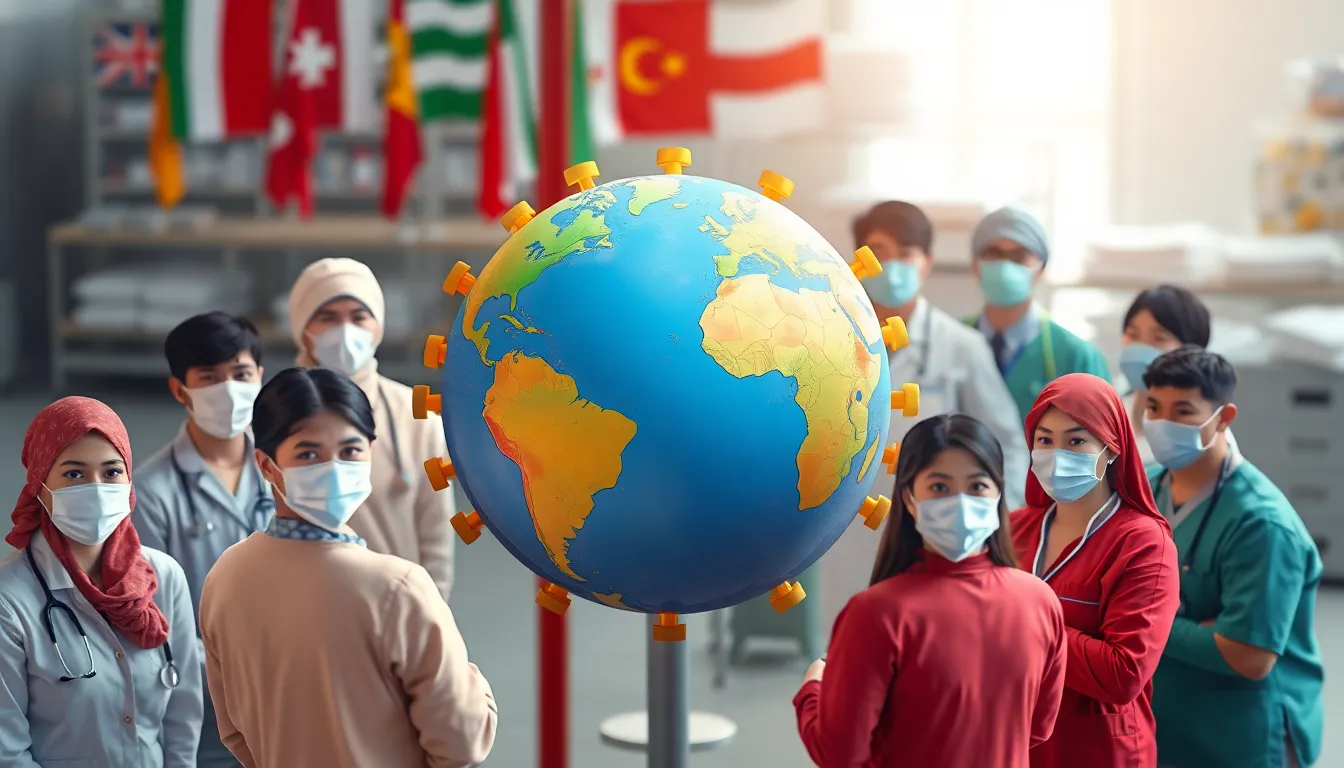The COVID-19 pandemic threw a wrench into the gears of global coordination, leaving many nations scrambling like a cat on a hot tin roof. As countries raced to secure medical supplies and vaccines, the usual harmony of international collaboration hit a sour note. It’s almost as if the world decided to play a game of “who can outdo whom” instead of working together to tackle a common foe.
How Did the Covid-19 Pandemic Challenge Efforts At Coordination in The International System?
The COVID-19 pandemic emerged in late 2019 and rapidly spread worldwide. By early 2020, nations faced unprecedented public health crises and economic challenges. Health systems struggled to cope with the surge in cases. Many countries reported shortages of personal protective equipment and critical medical supplies.
International cooperation started to deteriorate as competition for resources intensified. Countries imposed travel restrictions and export bans, limiting access to essential goods. This competitive behavior hindered global efforts to combat the virus effectively. Nations prioritized their interests over collaborative strategies.
Vaccine development progressed quickly, with multiple candidates entering clinical trials. The urgency led to unprecedented scientific collaboration. Despite this, distribution faced significant challenges. Wealthier nations secured large quantities of vaccines, leaving low-income countries at a disadvantage. The inequitable access underscored systemic inequities within the international community.
International organizations like the World Health Organization sought to facilitate coordination. They attempted to promote information sharing and resource allocation. However, fragmented responses complicated these efforts. Misinformation spread alongside the virus, leading to public confusion and distrust in health authorities.
The pandemic not only affected health systems but also challenged political relations. Diplomatic tensions grew as countries criticized each other’s handling of the crisis. The shift from global solidarity to nationalistic approaches weakened trust among nations, further complicating collective action against COVID-19.
Overall, the COVID-19 pandemic spotlighted vulnerabilities within the international system. It revealed how quickly coordination can break down in the face of crises. The lessons learned during this global challenge will shape future responses to similar threats.
Key Challenges in International Coordination

The COVID-19 pandemic challenged global coordination through various critical issues. Nations responded differently, revealing disparities in their approaches to handling the crisis.
Disparities in National Responses
Countries exhibited significant variations in their pandemic responses. Some nations quickly implemented stringent measures, effectively reducing transmission rates. Others struggled to mobilize resources and enforce public health guidelines. Wealthier countries frequently secured essential supplies first, monopolizing access to personal protective equipment and testing kits. In contrast, many developing nations faced dire shortages, impairing their efforts to combat the virus. These inconsistencies undermined international collaboration, as nations prioritized self-interest over collective action. As a result, disparities further exacerbated the global health crisis and exposed weaknesses in the international system.
Impact on Global Health Organizations
Global health organizations encountered immense challenges during the pandemic. The World Health Organization attempted to coordinate responses and share crucial data among member states. However, misinformation and conflicting narratives hindered its efforts to promote unity. Limited funding and support from some nations restricted the organization’s ability to provide assistance, hindering equitable resource distribution. Despite calls for coordinated action, a competitive landscape emerged as countries rallied to secure vaccines for their populations. This erosion of trust diminished the perceived effectiveness of international health organizations in managing the crisis, highlighting the urgent need for reform in global health governance.
The Role of International Institutions
International institutions faced significant challenges during the COVID-19 pandemic. Coordination efforts often fell short due to nationalistic policies and competing interests among member states.
United Nations and the World Health Organization
The United Nations and the World Health Organization served pivotal roles in responding to the pandemic. However, their effectiveness diminished due to fragmented responses from member states. Nations prioritized vaccine access and medical supplies for themselves, leaving the WHO struggling to promote global solidarity. Compounding this, misinformation circulated widely, further complicating coordination efforts. Wealthier countries secured vaccine doses early, exacerbating inequities and undermining the WHO’s initiatives. Despite these hurdles, the WHO aimed to facilitate data sharing and collaboration among countries to enhance global health responses.
Challenges Faced by Regional Organizations
Regional organizations encountered their own set of challenges during the pandemic. Various countries within regions adopted divergent strategies to combat the virus. Such differences hindered collaborative efforts and resulted in inconsistent regional responses. Organizations like the African Union sought to bolster coordination but faced issues like limited funding and resource disparities. As nations prioritized domestic needs, support for regional initiatives weakened, straining relationships and collective efforts. Regional health organizations’ impact diminished as competing national agendas took precedence over unified action.
Lessons Learned from the Pandemic
The COVID-19 pandemic emphasized critical lessons for global coordination. It highlighted gaps in preparedness and the necessity for effective communication among nations.
Importance of Preparedness and Communication
Preparedness emerged as a key factor in addressing health crises effectively. Countries with robust contingency plans managed to mitigate the impacts on their healthcare systems. Clear communication has proven essential for sharing important information during outbreaks. When nations shared timely updates on the virus, communities could respond more effectively. Misinformation amplified confusion and hampered coordinated responses, demonstrating the need for accurate data dissemination. Strengthening communication channels among public health officials and governments can facilitate more effective responses to future health crises.
Strengthening Multilateral Cooperation
Multilateral cooperation appeared vital in managing global health emergencies. Collective efforts demonstrated the power of collaboration in resource sharing. Nations that prioritized working together experienced more efficient responses compared to those that adopted nationalistic approaches. International organizations like the World Health Organization faced challenges in promoting unity due to competing interests. The establishment of equitable vaccine distribution systems exemplified the potential for effective collaboration. Investments in multilateral frameworks can cultivate resilience against future pandemics, ensuring that all countries can address health threats more evenly and justly.
Future Directions for Global Coordination
Strengthening global coordination emerges as a critical priority after the pandemic challenges. Countries must adopt proactive strategies focusing on preparedness and timely response mechanisms. Investments in multilateral frameworks offer a pathway to enhance collaboration at all levels. Strengthening institutions like the World Health Organization is vital for effectively managing future health crises.
Developing equitable vaccine distribution models offers lessons from the pandemic. Countries can establish agreements to share resources and technology fairly, ensuring that low-income nations gain equitable access to essential supplies. Transparent communication channels must be established to combat misinformation and promote informed responses during emergencies. Coordination hinges on clear messaging between countries to facilitate timely information sharing.
Regional organizations play a crucial role in fostering collaboration among member states. Increased funding for regional health initiatives can help address disparities and enhance collective responses. Divergent strategies among neighboring countries can be harmonized through coordinated policies, reducing confusion and improving health outcomes.
Leveraging data analytics for better health surveillance systems can enhance global health responses. Organizations should prioritize real-time data sharing to identify outbreaks swiftly. Encouraging collaborative research initiatives across borders can yield innovative solutions to public health challenges.
Engaging non-governmental organizations and the private sector can complement state-led efforts. These partnerships enhance resource mobilization, allowing for a more robust and flexible response to health emergencies. Building trust among nations will require consistent efforts at diplomacy and transparent exchanges of information. Enhancing resilience against future pandemics relies on unified action and collective approaches, ensuring that the international community is better prepared.
Conclusion
The COVID-19 pandemic exposed significant weaknesses in the international system’s ability to coordinate effectively. Nationalistic tendencies overshadowed collaborative efforts as countries prioritized their own needs, leading to inequities in resource distribution. Trust among nations eroded, complicating diplomatic relations and hindering collective action.
As the world moves forward, addressing these challenges is essential. Strengthening multilateral cooperation and enhancing communication will be crucial in building a more resilient global response to future health crises. By investing in equitable frameworks and fostering collaboration among international organizations, nations can work together to ensure a more coordinated and effective approach to global health threats. The lessons learned from this pandemic will shape the future of international cooperation, emphasizing the need for unity in the face of global challenges.









